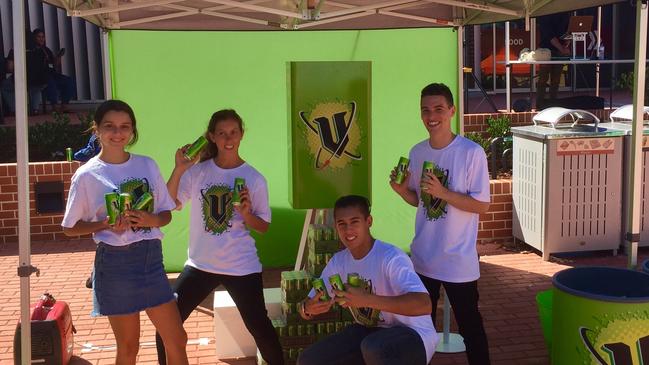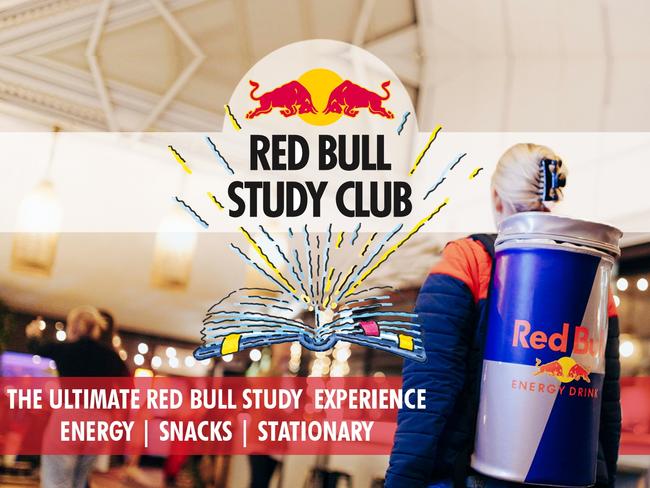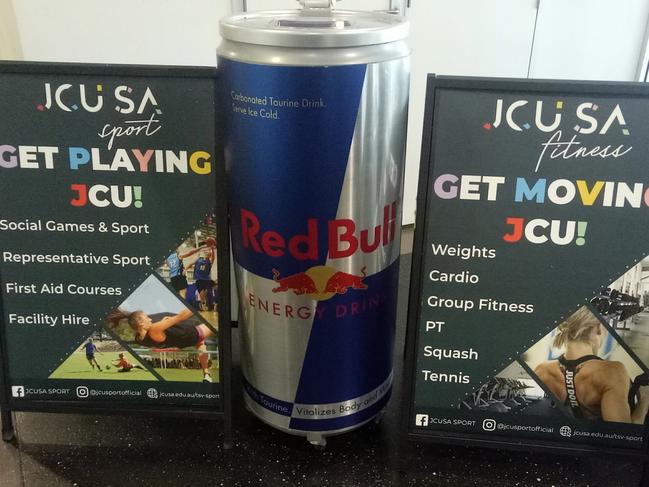Energy drink companies are advertising on university campuses to access ‘key’ student market
Red Bull and V Energy are running sophisticated marketing campaigns at universities across Australia and student unions are the gateway to campus.

Energy drink brands have embedded themselves into university life. Free energy drink cans are slipped into students’ hands during O-Week celebrations; energy drink companies sponsor everything from academic awards to student sports teams; and on-campus events are hosted by Red Bull.
With advertising efforts led by “on-campus marketing specialists” and “student marketeers”, products such as Red Bull and V have become ubiquitous on campuses around the country.
Now public health experts are alarmed that universities are allowing marketing of potentially harmful drinks on their campuses.
In an analysis of the 25 Australian universities with the highest enrolment, The Australian found Red Bull advertised “student marketeer” jobs at 21 of the campuses over the past two years. Advertised as part-time positions, the marketeers earn about $28 an hour, according to reviews on jobs website Glassdoor.
These roles form part of Red Bull’s 4000-strong global band of student marketeers who run stalls at O-Week events and conduct promotions “on and off campus”.
“They’re here to get you hooked on energy drinks,” said Dr Alexandra Jones, a public health lawyer at The George Institute for Global Health.
Energy drinks can have “damaging effects” according to Australia’s Alcohol and Drug Foundation, including links to anxiety, tooth decay, obesity, and Type 2 diabetes.
A recent job advertisement for student marketeers at The University of Melbourne described the role as helping to “establish Red Bull consumption in different moments of need”.
The roles advertised are not endorsed by or affiliated with The University of Melbourne.
The ad highlighted that Red Bull sees university students as opinion leaders among their peers who can persuade their behaviour, Dr Jones said.
“They come to university and from day one, from O-Week, the message from them is that energy drinks are a part of your success as a student.”
These marketing programs have a large reach. A 2018 promotion for V, organised by marketing company Campus Group, reached more than 220,000 students at orientation weeks across 17 university campuses. This promotion gave away 113,152 cans of the drink.
Campus Group, which calls itself “a global youth agency, targeting students”, has long been involved in energy drink marketing. An earlier iteration of the company ran the first Red Bull ambassador program in Australia.
The group describes itself as being “the first to take experiential marketing into the university space”.
Student unions play a big role in these marketing efforts. Of the 25 universities examined by The Australian, at least 16 of their student unions had current or recent partnerships and promotions with Red Bull.
Advertising and sponsorship guides from unions at the Queensland University of Technology and The University of Western Australia show on-campus “activations” – where brands set up marquee giveaways on-campus – can cost as little as $200.
Among these promotions is The University of Adelaide’s YouX handing out showbags at O-Week, which contained “items of value” including condoms, Red Bull cans, and soft drinks – all the essentials.
One of the most common promotions is the Red Bull Study Club run by student unions at RMIT University, The University of Sydney, and The University of Queensland, among others.

This promotion was designed to associate the desire to perform well at university with stimulating energy drinks, said Dr Michael Callaghan, a lecturer and researcher in marketing and management at Deakin University.
He said student unions had been the way for companies to advertise on university campuses “since day dot”.
“Why would you want commercial interests coming onto your campus to flog their products, and you’re not making anything out of it? And so, this is why it got formalised by student unions who then became very organised.”
He said big companies such as Red Bull were getting great value when marketing through student unions.
“It’s a small amount of money compared to their overall market, and the bang for buck that they get out of being involved in these things is enormous,” Dr Callaghan said.
Many on-campus marketing events are organised with the Student Experience Network, an organisation made up of 56 student unions and associations.
These unions then have access to “large-scale marketing and promotional campaigns and preferential support from product and service providers” provided by SEN. Red Bull is a “platinum partner” with SEN.
SEN acts “as a conduit” between Red Bull and member organisations, said SEN chief executive Paul Clayton. “We would reach out to members and ask who wants to work with Red Bull to engage students on campus and they respond on a case-by-case, campus-by-campus basis,” Mr Clayton said.
“Our current partnership with Red Bull is a contract arrangement for the supply of energy drinks to members at competitive rates.” They also “provide both products and entertainment on campus to support their university experience”.
SEN does not have a current formal arrangement with Suntory Oceania, owners of V Energy.
Dr Callaghan said the demographics of university students matched with one of Red Bull’s “key demographic markets”, with universities containing a high density of potential users.
He said university students had long engaged in stimulant use throughout their studies, pointing to the stimulant tablet No-Doz as a precursor to energy drink usage.
“No matter what projections we might make about potential target markets at this point in time, the highest density target market for that product are university campuses,” Dr Callaghan said.
Public health experts are particularly concerned because of the possible health effects of energy drinks. Dr Rajshri Roy, a senior lecturer in Dietetics at the University of Sydney, said these drinks were typically very high in added sugar and high in caffeine.
As well as the weight gain and dental health impacts, she said, people could develop a reliance on the added stimulants to stay awake and alert. This could be particularly acute in a university environment where students faced tight deadlines and varying schedules.
“Diet is also hugely related to how you feel overall. I don’t think that being a long-term consumer of energy drinks is good for people’s mental health,” Dr Jones said.
She said energy drinks had no nutritional benefits, meaning you often didn’t feel full when you consumed them.
“It’s very easy to kind of overconsume your energy intake if you have big sugary drinks because if you add it to your lunch, you probably won’t compensate later by not having a snack because they don’t make you feel full.”
With this risk of overconsumption, Dr Jones said the large amount of caffeine could have serious cardiac implications. She cited research showing excessive consumption has been linked to heart attacks. This includes a 2019 study published in the Journal of the American Heart Association that showed a link between energy drink consumption and an increase in emergency room visits and deaths.
While universities generally have health, safety, and wellbeing policies, most tend not to have food policies. Dr Roy said this was a problem because universities could have unhealthy food environments for students and staff.
Research published in BioMed Central in 2015 has shown that university students can gain up to 4kg in their first year.
Young students coming straight from high school might not have the knowledge or experience to make informed choices about their consumption, Dr Roy said.
“It comes down to universities having a significant role to play promoting the health and wellbeing of their prospective students,” she said. “Allowing companies to market energy drinks on campus can be seen as conflicting with that responsibility.”
The Australian approached universities that recently had energy drink promotions on their campus. Asked what marketing partnerships existed, James Cook University said it did not “have any partnership with Red Bull, V, or any other energy drinks”.
Responding to an example of their student union giving away free Red Bull drinks on the Townsville campus, the university said: “There may be some sort of arrangement between the JCU Student Association and Red Bull … They are a separate entity to James Cook University.”

Dr Jones believes universities can do more to control what student unions promote: “The university does have the ability to govern what kind of conduct happens on campus.”
Dr Roy said that because of the vulnerability of students adapting to a new life stage and the evidence of poor dietary habits among students, universities had a responsibility to make sure the type of food promoted is healthy and affordable.
Universities generally held themselves to a higher standard, Dr Jones said. “There are certain rules about what’s okay and not okay on campus, and advertising of certain products can be within that, and then we would say unhealthy products rightly could be within that too,” she said.
While universities often had rules about what was acceptable advertising on campus, Dr Jones found that they were often “outdated” and did not capture digital marketing, such as what a student union posted on Instagram.
When asked about the concerns raised by public health and a promotion to give 480 cans of Red Bull to students during exam season, the University of Melbourne’s International Student Union said: “Many students have expressed that energy drinks are helpful, which is why we had chosen to collaborate with Red Bulls (sic) in previous events. However, we have been considering the concerns regarding energy drinks and we will explore healthier alternatives (eg coffee) in the future.”
A University of Melbourne spokesman said the student union “operates independently of the university and may engage in sponsorship arrangements with external companies to support its activities”.
Red Bull and Suntory Oceania did not respond to requests for comment.





To join the conversation, please log in. Don't have an account? Register
Join the conversation, you are commenting as Logout